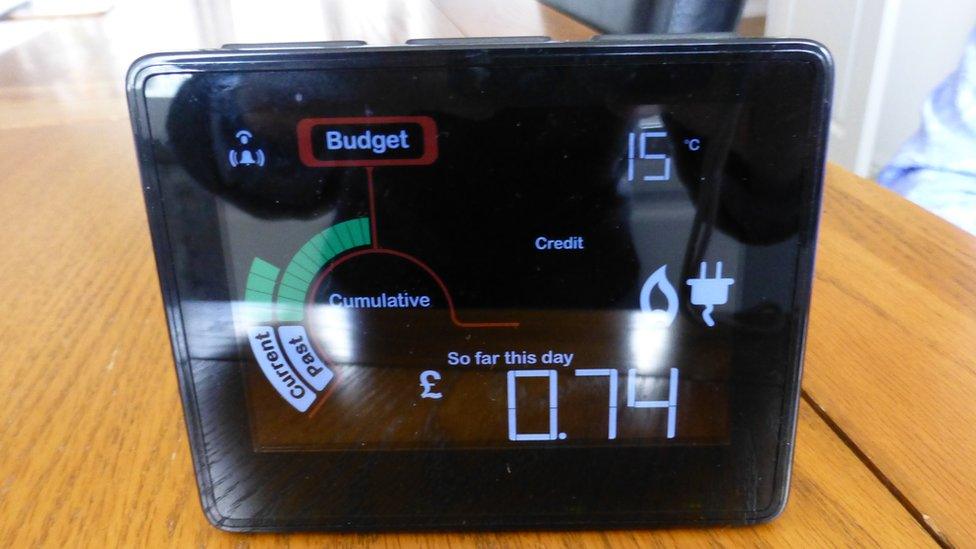Can smart switching cut your energy bills?
- Published

A new generation of energy switching services is emerging, claiming to offer better ways for millions of people to cut their gas and electricity bills.
They are designed to help overcome the problem of inertia - the seemingly stubborn refusal of more than 17 million UK households to switch energy suppliers regularly, despite the large potential savings available to those which do.
Ministers and regulators endlessly encourage non-switchers to seek out better deals for gas and electricity as the key to forcing the energy market to become more consumer-friendly.
But with fewer than 15% of households switching last year, this strategy seems not to be working.
The way the energy market now operates, people who switch suppliers benefit from the attractive low-price deals companies offer new customers.
Those who rarely or never switch mostly end up paying companies' notoriously expensive Standard Variable Tariffs (SVTs).

Some smartphone apps now claim to make it easier for customers to switch
In a recent report on the energy market, the Competition and Markets Authority (CMA) found households on SVTs pay around £330 a year more than people who switched.
This gap has been growing - three years earlier, the difference was less than £200.
'Press of a button'
At Voltz, a smartphone-based switching service launched last year, head of operations Florian Ritzmann believes a key cause of inertia is distrust.
"The switching market has been poisoned by its past," he says.
"Doorstep mis-selling, fines for suppliers which mistreat customers, and comparison websites which allegedly withhold information from companies which don't pay commission have all helped spread mistrust among customers."
Most damaging of all, Mr Ritzmann says, is the way most energy companies switch customers back to expensive SVTs as soon as lower-priced deals run out.
"With energy," he says, "loyalty has never been rewarded."

Florian Ritzmann says loyalty to energy firms is never rewarded
As with conventional switching sites, once customers enter their basic contact details, energy supplier, consumption and tariff, the Voltz app will set out all the deals on offer and how much switching supplier should cut bills.
And, if a customer does decide to switch, with companies which pay Voltz commission, the process can be done on the app with a press of a button. With other suppliers, Voltz provides a button to let users call them directly to arrange a switch themselves.
Automatic switching
For people who don't want to be bothered with switching at all, another new service, Flipper, will not only identify the best deals for its customers but switch suppliers on their behalf.
Flipper's co-founder and chief executive Talal Fathallah says once customers have signed up, their service takes care of everything.
Customers don't even have to know how much energy they use.
"We pull in your consumption data directly from your energy provider from your online account, or if you don't have one, we'll set one up for you," he says.
"We then find you a quote within one working day. You then will get an email telling you who your new provider is and information about your new deal."

Flipper does not take commission from any energy suppliers
Everything, Mr Fathallah says, including the choice of new supplier and the switching process itself, happens automatically.
Flipper's systems then regularly check users' accounts and, if better deals appear, it switches them again - automatically.
Savings
But automatic switching isn't the only big difference between Flipper and other switching services. Flipper doesn't take commission from the energy suppliers they switch users to.
Instead, it charges a £25 annual subscription which is only paid if a user gets savings of £50 or more.
"We've been offered commission by some energy companies," Mr Fathallah says, "but we turned it down because there would be a real conflict of interest issue for us."
Though it's still early days for Flipper and Voltz, both services are enjoying favourable reviews from what they claim to be a rapidly growing customer base.
As other new services join them - some are already up and running - it looks likely that the smart switching idea may catch on, perhaps finally providing a way to reduce the inertia which costs so many UK customers so much extra money on their gas and electricity bills.
- Published1 July 2016
